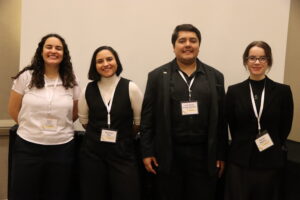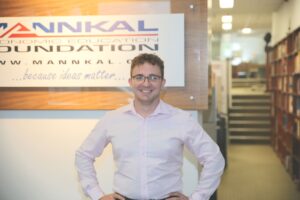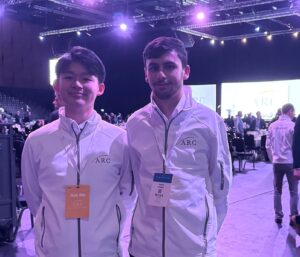‘The Economics of the Future’
It has been nearly two weeks since I arrived in London. I have settled in nicely and am enjoying the summer heat that reminds me so much of my home back in Perth. I was lucky enough to do some sightseeing: visiting the British Museum, Buckingham Palace, and catching Les Misérables in Leicester Square, before returning to the IEA office the next week for the Future Thought Leaders’ Programme.
The second half of the programme covered many insightful topics including the taxation of companies, housing reform, and social health insurance. We also had the opportunity to hear from the various departments in the IEA including the Research, Outreach, and Operations teams. Although a tough decision, my favourite presentation was from Stephen Davis, the Head of Education at the IEA, who spoke about the ‘Economics of the Future’.
Davis explained that the 1920s to 1940s was a period of great innovations that enabled massive gains in productivity, with the inventions of the washing machine and electronic computers being notable examples. However, from 2008 onwards, economic growth began to slow down in developed countries, averaging 1% per annum due to the fluctuations between rapid booms and recessions. Although major innovations in the last thirty years have made our lives easier and more convenient, productivity gains are quite marginal and have caused downward pressure on economic growth. Looking to the future, Davis is optimistic and believes that productivity gains in innovation are not inevitably diminishing but rather have the potential to rise significantly. He proposed three promising sectors of innovation: AI and automation, bioscience, and anti-ageing technology.
By approximately 2040, Davis predicts that AI and automation will facilitate significant increases in productivity due to the rapid progress experts are making in machine learning technology. Many implications arise from this prospect, the most notable one being the question of what types of work will be demanded. Davis predicts that the rise in AI and automation will create huge boosts in the demand for manual labour, as people will only automate processes if the marginal benefit exceeds the marginal cost. Furthermore, the maintenance of machines and AI would be able to create new jobs that do not currently exist in the labour market.
The second sector of innovation is bioscience. Davis predicts that agriculture, particularly livestock farming, will not be a significant human activity in the next thirty years due to being unsustainable and damaging the biosphere. As such, there could be a potential market for the development of synthetic foods. Research into producing meat with plants would provide many benefits including freeing up land as well as appealing to the current trend of cruelty-free foods. Vertical farming and hydroponic agriculture are current drivers in this new market, having the ability to grow six to seven crops a year out of a small area of land compared to the one to two crops in the current agricultural industry – this technology funnily enough developed by cannabis farmers. It is interesting to see the prospect of synthetic foods as being far nearer than anticipated.
The last sector of innovation is anti-ageing technology. In the mid-1970s, scientists believed that humans were genetically programmed to age, with ageing being the culminating effect of biological processes that take place within certain species. In essence, ageing was to be known as something inevitable. However, Davis predicts that in thirty years’ time, scientists will discover the technology to stop or reverse ageing, significantly increasing our life expectancy. This results in many implications that may change the framework in which our world operates, with institutions of marriage and work, and potential population growth radically changing due to this innovation.
Aside from seminars, the IEA programme also included an individual research project and a group policy proposal. I decided to conduct my research on development economics from a classical liberal perspective and explored the implementation of free market policies in different countries, with Argentina and Japan being my case studies. It was interesting to witness how both countries attempted to adopt classical liberal ideas but ended up at completely different levels of economic growth. With the guidance of my tutor, Matthew Lesh (Head of Public Policy at the IEA), I concluded that political institutions are integral to implementing long-lasting reforms and that bold new policy frameworks fail to break long-standing habits.
For the policy proposal, my group was assigned to resolve the issues regarding the structure of Whitehall, the Civil Service, and the Government, particularly the inefficiencies of the Home and Foreign Office. Our group proposed administrative and fiscal decentralisation to reform the public sector and improve the efficiency of public services. By decentralising the government, the knowledge problem is resolved as local governments have better insights into citizens’ preferences and needs. We acknowledged that the success of decentralisation depends on the implementation scheme and reinforced the importance of a clear assignment of responsibilities to allow authorities to be held accountable for potential policy shortcomings. Drafting and presenting our policy proposal was a fantastic learning opportunity as we received direct feedback on the areas we could improve on.
The last day of the Future Thought Leaders’ Programme finished with an award ceremony. I am so grateful to have received ‘The Best Debate Team’, ‘The Best Debater’, ‘The Best Individual’, and the ‘Best Policy Proposal’ Award – it feels incredible to have my hard work recognised by my mentors and classmates. I am so appreciative to have had the opportunity to learn from the amazing IEA team – from the academics and researchers to the communications and outreach departments, and to have developed such strong friendships with my classmates. I look forward to seeing what the future holds for the IEA and will most definitely keep in contact with the incredible people I have met on this journey.






